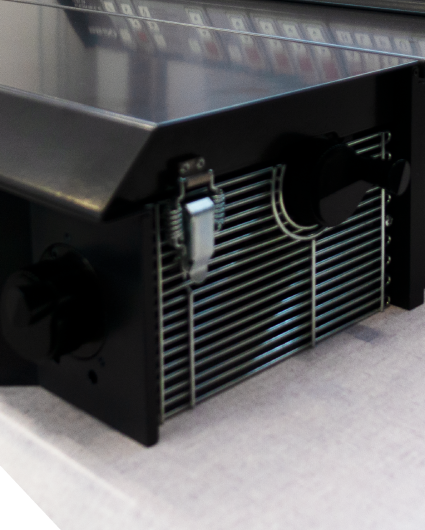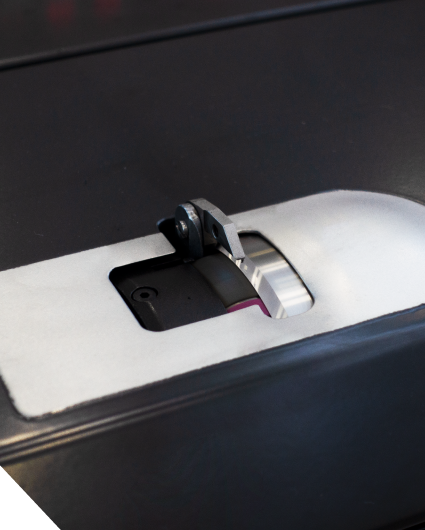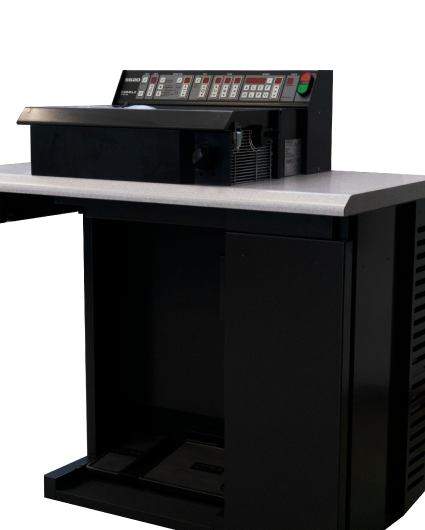
Work area: 1050mm x 550mm
SS20
SS20: the major departure from
the traditional skiving machine
The computer installed in the SS20 has made it possible to introduce some unique features.
SECTORS
Footwear, Leather Goods
CONFIGURATIONS
The skiving parameters (thickness, width, angle, feed speed) are shown on a display and can be micrometrically adjusted.
Perfect efficiency
and immediate accessibility

COMPUTERIZED SKIVING MACHINE
The SS20 was born from the accurate application of modern mechanical and electronic technology. It represents a major departure from the traditional skiving machine. The computer installed in the SS20 has made it possible to introduce some unique features. The machine, in fact, is constantly monitored, it adjusts itself automatically and stays perfectly efficient while in operation. All functions are performed by mechanical units driven by independent motors operating under the direct control of the computer. The originai structure of mechanical inits has made it possible to use a tilting electro-spindle, thus allowing an immediate accessibility to mechanical parts and an easier knife and grindstone replacement. The console can be easily reached and the data displays are very clear. An efficient dust collector is built in the frame of the machine.

KNIFE POSITIONING
The gap between the cutting edge and the presser foot is preset by the operator with micrometric precision. An automatic device enables this gap to be maintained by moving the knife forward as it wears out. This very important automatic device provides for the maintenance of a hight level of skiving efficiency and avoids frequent and accurate adjustments.

KNIFE SHARPENING
AND CRINDSTONE DRESSING
These two operations, which in traditional machines cause a remarkable loss of time, are automatically performed by the machine, according to the parameters chosen by the operator (pressure, duration and interval). It is also possible to have the machine performing continuous sharpening for special skiving works. The operator can activate and deactivate knife sharpening and grindstone dressing at any time, within his or her own discretion.

PROCESSING OF WORKPIECES
WITH DIFFERENT TYPES OF SCARF
For those workpieces which profile requires different skiving styles it is possible to program the necessary sequence. The operator has only to recall on the sequence display the required types of scarf in the correct order. Afterwards, just a slight pressure on the pedal will make the machine shift from one configuration to the next. It is also possible to store these sequences in memory, making use of the ample and versatile memory of the machine.

WORKPIECE FEEDING
The feed roller turns, by choice of the operator: continuously, at the predetermined speed; at a variable speed, controlled by a pedal. In both cases the work feeding speed can be very accurately set and ut is not influenced by thickness an toughness of the material being processed. These features make the skiving of workpieces with a complicated outline very easy. A Knee operated switch lifts the presser foot to release the workpiece at any moment.

SKIVING
The skiving parameters (thickness, width, angle, feed speed) are shown on a display and can be micrometrically adjusted. The operator adjusts skiving parameters and the data are automatically stored in memory, in the activated section. There are two scarf width guides: movable and fixed. Both are present at the same time and can also be alternatively used on the same workpiece. The movable guide allows a fine adjustment of the scarf width. It is possible to program its disappearance under the work area to allow the use of the fixed guide. This guide, positioned under the presser foot near te knife, is perfect for complicated skiving and for workpieces with very tight curves. The unavoidable presser foot wear can be compensated directly through the control board of the machine for every scarf at the same time, to guarantee constant skiving quality.

DATA STORAGE
The machine has a memory for 800 different types of scarf (100 groups of 8) and each one is immediately accessible. It is sufficient to press a button to recall the required type of scarf. The operator can improve or modify the current scarf parameters configuration at nay time. The new adjustment is stored in memory, replacing the former data.
